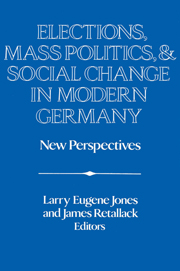Book contents
- Frontmatter
- Introduction
- PART ONE ELECTORAL POLITICS IN AN AUTHORITARIAN REGIME
- PART TWO GENDER, IDENTITY, AND POLITICAL PARTICIPATION
- PART THREE LOCAL DIMENSIONS OF POLITICAL CULTURE
- PART FOUR THE NATIONAL PERSPECTIVE CONTINUITIES AND DISCONTINUITIES
- 13 1918 and All That: Reassessing the Periodization of Recent German History
- 14 Generational Conflict and the Problem of Political Mobilization in the Weimar Republic
- 15 The Social Bases of Political Cleavages in the Weimar Republic, 1919-1933
- 16 The Formation and Dissolution of a German National Electorate
- Index
14 - Generational Conflict and the Problem of Political Mobilization in the Weimar Republic
Published online by Cambridge University Press: 05 January 2013
- Frontmatter
- Introduction
- PART ONE ELECTORAL POLITICS IN AN AUTHORITARIAN REGIME
- PART TWO GENDER, IDENTITY, AND POLITICAL PARTICIPATION
- PART THREE LOCAL DIMENSIONS OF POLITICAL CULTURE
- PART FOUR THE NATIONAL PERSPECTIVE CONTINUITIES AND DISCONTINUITIES
- 13 1918 and All That: Reassessing the Periodization of Recent German History
- 14 Generational Conflict and the Problem of Political Mobilization in the Weimar Republic
- 15 The Social Bases of Political Cleavages in the Weimar Republic, 1919-1933
- 16 The Formation and Dissolution of a German National Electorate
- Index
Summary
The literature on generational conflict and its role in the rise of National Socialism is indeed extensive. With few exceptions, the principal thrust of this literature has been to trace a direct line of continuity from the rebellion of the German youth movement in the Wilhelmine period to the alienation of the younger generation and the rise of National Socialism in the Weimar Republic. Yet for all the interest that the problem of generational conflict in the Weimar Republic has attracted, little attention has been devoted to the efforts of the more established bourgeois parties to overcome the alienation of the younger generation and - at least in the case of the German Democratic Party (Deutsche Demokratische Partei or DDP) and German Center Party (Deutsche Zentrumspartei) - to win it over to the support of the Weimar Republic. These parties, after all, were acutely aware of the extent to which their own political effectiveness, as well as the survival of the political order with which they were so closely identified, depended upon the outcome of their efforts to win the support of those young men and women who had reached political maturity since the last years of the Second Empire. The purpose of this essay, therefore, is to trace the general outlines of the relationship that developed between Germany's nonsocialist parties and the younger generation in the Weimar Republic and to suggest why by the beginning of the 1930s these parties, with the notable exception of the Center, had failed to attract and retain the support of Germany's younger voters. At the same time, this essay offers at least a partial explanation of why Weimar's younger generation proved so susceptible to the appeal of Nazism.
- Type
- Chapter
- Information
- Elections, Mass Politics and Social Change in Modern GermanyNew Perspectives, pp. 347 - 370Publisher: Cambridge University PressPrint publication year: 1992
- 3
- Cited by



